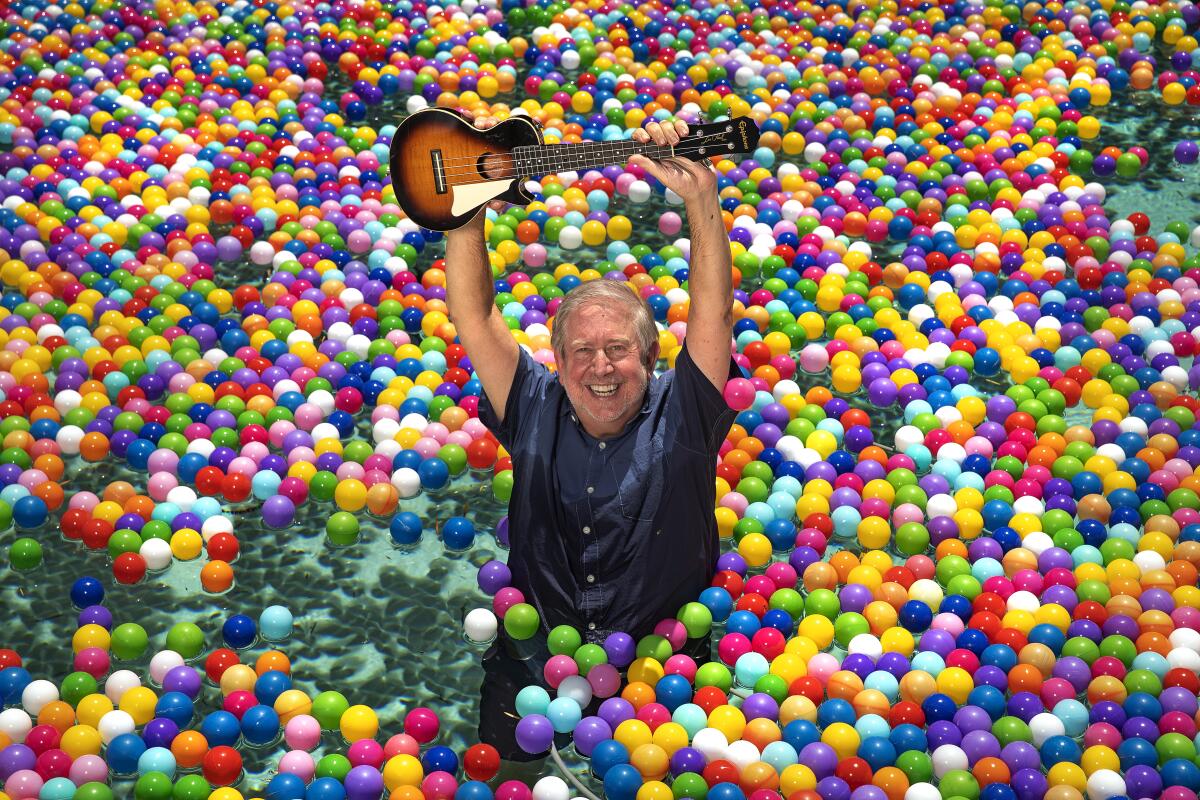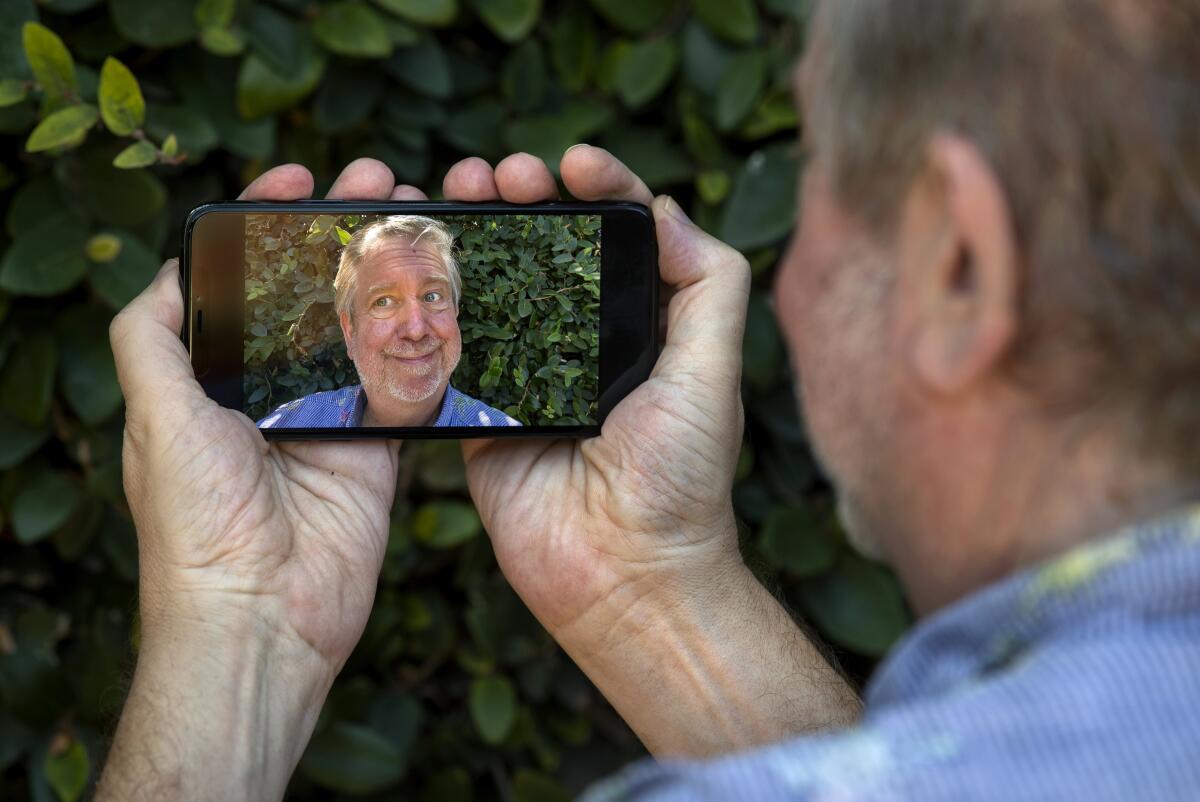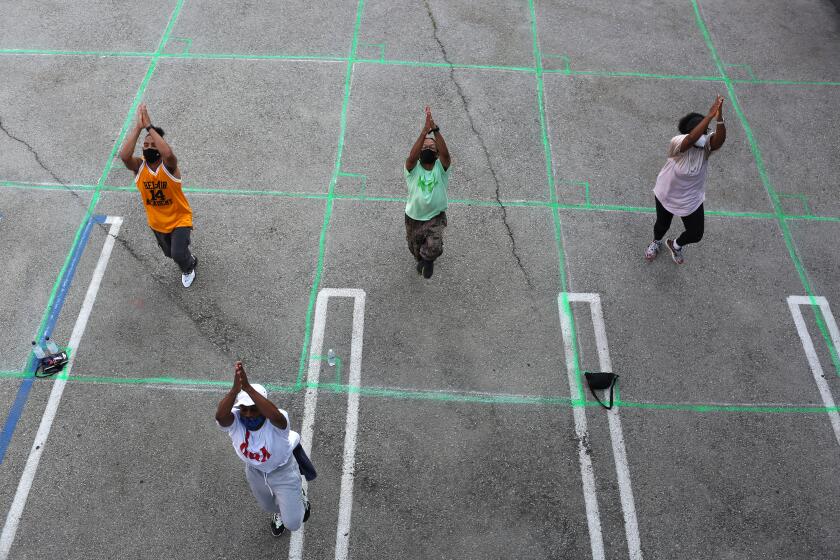Big heart, zero budget: The COVID-19 benefit filmed by stars on their phones

- Share via
In the six months since the COVID-19 pandemic hit this country, home-bound audiences have become accustomed to watching virtual productions of all kinds: livestreamed concerts, awards shows beamed to us from across the globe and, for the first time in history, a surprisingly slick Democratic National Convention that was almost entirely virtual.
In our brave new socially distanced world, it’s easy to to forget it wasn’t always this way. One particularly striking example: “Soundtrack of Our Lives.”
Filmed in the early days of the pandemic, the production was made in support of the MusiCares COVID-19 relief fund, which helps the music community in times of need and is administered by the National Academy of Recording Arts and Sciences. More than 150 major actors, singers, songwriters, composers, engineers, musicians and more all volunteered for a show for which there was no existing blueprint.
The names read like the red-carpet arrivals at the Grammys: Catherine O’Hara, Reba McEntire, Sting, Mandy Moore and Hans Zimmer. Darren Criss, Patti LuPone, Peter Gallagher, Elisabeth Moss and Weird Al Yankovic. Danny Elfman, Zachary Levi, Clive Davis, William Shatner, Kathryn Bostic, Rita Wilson and, yes, even Kermit the Frog. Some acted in skits, others sang, other simply spoke a line or two about the value of music.
The special was cocreated by Richard Kraft and music contractor Peter Rotter and written and directed by Kraft, who had directed Disney live-concert performances at the Hollywood Bowl including “The Little Mermaid,” “A Nightmare Before Christmas” and “Beauty and the Beast.”
Kraft is also a preeminent agent for film and television composers and yet, like the rest of America, he found himself sidelined at home as the pandemic swept the country, laying to waste his beloved film and TV music industry. He felt restless and compelled to do something, anything.
His answer? “Soundtrack of Our Lives,” an earnest ode to all things film and music. The lo-fi production values now stand as a charming, at times zany testament to the earliest days of COVID-19 and the banding together of the music community to fight it — a touching effort that proves only more endearing with a modest amount of hindsight.

In normal times such a production would be well-funded and technically deep, with swarms of camera crews, publicists, makeup artists, hairstylists and production assistants running around in well-choreographed circles to create the kind of movie magic for which Hollywood is known.
These were not normal times. “Soundtrack of Our Lives” was instead created with zero budget and relied on every participant to film his or her own part at home using only a phone. Sometimes Kraft would direct via FaceTime or Zoom, and he always sent meticulous notes for how to achieve the best technical results. His No. 1 admonition: Please, please film in horizontal, and for goodness’ sake, use your phone’s 4K resolution.
A mode of working that is commonplace in September felt new in March and April, not only to Kraft but to the celebrities he had recruited.
“If you look in my eyes, or some of these people in the show, we’re still a little scared,” said John Stamos, who played a slick host for a fake game-show skit called “Name That TV Tune!”
This was months before pandemic productions ballooned into more high-tech affairs, with crews dropping off lighting and professional cameras at the homes of talent and then working over Zoom to get shots just right.
Stamos recently filmed a national Geico commercial at home. “They dropped off two truckloads of stuff, and we shot the whole thing, just me and my assistant,” he said. The actor added that there was something reassuring about staring at Kraft for an hour over FaceTime.
Kraft likened the experience to the early days of film. For example, when songwriter Alan Menken sang “A Whole New World” from the Disney film “Aladdin” in his living room accompanied by his daughter Anna Rose, the performance was great but the audio was no good. So Kraft went back to Menken and asked him to lip-sync to his own video.
“Even within the three months that we made it, things had to get better technically because we were starting to watch stuff that was getting better and certain things we thought we could get away with became unacceptable,” Kraft said of his show, which was finally released in late June and is available to stream through Sept. 25.
“Soundtrack of Our Lives” concludes with songwriter Paul Williams’ Oscar-nominated tear-jerker “Rainbow Connection” from “The Muppet Movie.” The medley includes footage of Williams along with Kermit the Frog, featuring cameos by Lucy Lawless, Ken Page, Orfeh and Judith Hill, among others.
Williams had a friend and collaborator, lyricist Chris Caswell, film him using an iPad in Caswell’s home studio.
“Who knew that shooting selfies was going to be like going to film school?” Williams said. “Again, through the technology, the art survives. The art thrives.”
As president of the performance-rights organization American Society of Composers, Authors and Publishers, better known as ASCAP, Williams knew firsthand just how painful the pandemic has been for musicians and others in the industry.
“I think it’s very important not to lose our sense of humor, and realize that what we are participating in is like nothing we’ve experienced in our lifetimes,” he said, adding that despite a hip replacement he still manages to run three miles each day in a gambit to stay healthy during a time that feels like “living in a Ray Bradbury novel.”
Record producer and songwriter Harvey Mason Jr., who as interim president of the Recording Academy is helping to administer the COVID-19 MusiCares relief fund, agreed with Williams that music will find its way through the darkness. He just doesn’t know when the industry can expect to see the light.
Dance studios including Edge Performing Arts Center and Ryan Heffington’s Sweat Spot have closed or gone virtual. Goodbye for now or goodbye forever?
“The prognosis does not look good,” Mason said. “This is going to continue longer than any of us thought.”
Mason said that for the first five months of the crisis, MusiCares received 500 to 600 applications for aid per day, and it distributed about $20 million to people in need. The organization has kicked into Phase 2, targeting funds to help applicants pay rent, see a doctor or buy groceries for their families.
That effort is what inspired so many stars to lend their faces, music and voices to Kraft’s effort.
Filming the special made contributors feel connected, said composer Pinar Toprak, who was recently nominated for an Emmy for her work on the HBO documentary “McMillions.”
“It just made me feel closer to everybody, especially early on when we didn’t really know what was going on,” she said. “It was scary. It was uncertain. There was a lot of ambiguity.”
Kraft’s superpower, she said, is bringing the right people together at the right time. To feel like more than one person alone in a room. To create a virtual community — one built to last until we can come together again and no longer make music forged in isolation.
More to Read
The biggest entertainment stories
Get our big stories about Hollywood, film, television, music, arts, culture and more right in your inbox as soon as they publish.
You may occasionally receive promotional content from the Los Angeles Times.












